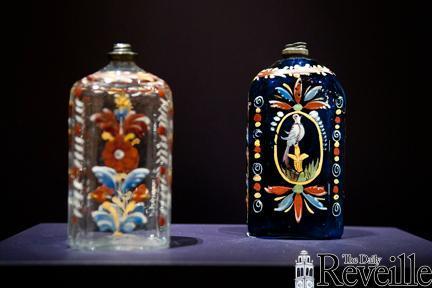Alcohol permeates many aspects of Louisiana culture, but few recognize the origins or impressive evolution of their favorite drinks.
The LSU Museum of Art will host “History of the Cocktail” tonight, offering attendees an opportunity to delve into the flavorful history of mixed drinks.
Lafayette-based bar master Luke Tullos will demonstrate his extensive knowledge on the subject, and the museum will present its “Beer, Wine & Spirits” exhibit, which offers a series of art pieces and historical cocktail-related items, like glassware, tools and pewter, dating back to the 1700s.
LSU Museum of Art curator Natalie Mault explained the event will include items from the museum’s permanent collection, which date back to the 18th, 19th and 20th centuries. She said many of these items embody the history of Baton Rouge, the state of Louisiana or even the nation as a whole.
“Nobody would describe them as fine arts, but there’s no doubt they’re a decorative arts item,” she said.
Tullos, head bartender/mixologist at Jolie’s Louisiana Bistro in Lafayette, will showcase his historical knowledge by serving up multiple mixed drinks from different eras of the cocktail’s evolution, beginning with an 18th-century alcoholic punch and then delving into the development of mixed drinks in the 19th century.
“That’s basically where the job of bartending started,” he said. “We’re going to go from there and move through the timeline of cocktails and mixology and alcohol.”
The bar master will also discuss some of the items on display in the “Beer, Wine & Spirits” exhibit, examining the tools and glassware bartenders use and their historical development.
For Tullos, learning about the historical significance of alcoholic beverages is part of both his job and his personal fascination.
“[Alcohol] has been a part of humanity for thousands of years,” Tullos said. “We drink. It’s what we do. … Alcohol is a vital part of who we are as humans – but also, you need to drink it responsibly.”
Tullos explained the cocktail industry is still rebuilding from the effects of Prohibition, when bars shut down and the alcohol industry shifted to producing liquid used for medical purposes during war time. Only recently did cocktails begin expanding and evolving. He said many people within the industry are attempting to bring back pre-Prohibition practices and traditions.
“There was a time before Prohibition where the cocktail was much more developed and much more robust than it is today,” he said. “We’ve got a growing cocktail industry right now – it’s booming right now, but we’re still trying to catch up.”
While bartending at Peché in Austin, Texas, the Lafayette native learned many traditional methods and began his extensive interest in cocktail history.
“They had an entire program that was based in those practices,” he said. “I needed to bring this to Lafayette.”
But there’s more to working in the bar industry than serving up and learning about drinks, Tullos said.
“Being a true bartender is being a host and learning your customers, reading your customers and understanding that they’re here to experience something that you’re there to provide,” Tullos said.
The 21-and-up event begins at 6 p.m. Tickets cost $15 for museum members and $25 for non-members.
—-
Contact Austen Krantz at akrantz@lsureveille.com
Bar master to serve cocktail history at LSU Museum of Art
March 21, 2012

LSU Museum of Art is hosting “History of the Cocktail” this evening from 6 to 8 p.m. The program complements LSUMOA’s “Beer, Wine & Spirits” exhibit.




